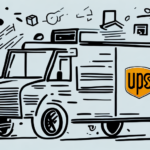How Much Does UPS Insurance Cost Per $100?
UPS Insurance is a vital service that protects your shipments against damage, loss, or theft. But how much does it cost to insure your packages with UPS? In this article, we explore the cost of UPS insurance per $100 and cover every other important detail you need to know about this service. Let’s dive in!
Understanding UPS Insurance and Its Importance
Before delving into the cost of UPS insurance per $100, it's essential to understand what UPS insurance entails and why it's crucial for your business. UPS insurance is a protection service that safeguards your parcels against potential losses or damages during transit. This coverage is especially important if you handle valuable or fragile items that require extra care during transportation.
Misfortunes such as theft, breakage, or loss can occur during delivery, resulting in significant financial losses. Fortunately, UPS insurance allows you to claim compensation covering the cost of the package's contents and its shipping fees.
It's important to note that UPS insurance is not automatically included in your shipping fees. You need to purchase it separately, and the cost varies depending on the value of your package and the level of coverage you require. Assessing the value of your shipment and determining the appropriate coverage is crucial to avoid any financial losses in case of mishaps during transit.
Factors That Affect the Cost of UPS Insurance
The cost of UPS insurance varies based on several factors, including:
- Declared Value: The item's declared value and its contents.
- Shipping Distance: The distance or destination of the shipment.
- Service Level: The selected UPS service level.
- Packaging Type: The type of packaging used.
High-value packages, such as jewelry, art pieces, or electronics, may incur additional insurance fees. The mode of transportation also plays a role; air shipments typically cost more to insure than ground shipments due to higher risks.
Moreover, the timing of your shipment affects the cost. Expedited shipping options, which involve more handling and a higher risk of damage or loss, generally result in higher insurance costs compared to standard shipping options.
Calculating UPS Insurance Cost per $100
UPS insurance costs are calculated based on the declared value of your package per $100. The rates follow a sliding scale, where the price per $100 of insurance coverage decreases as the package value increases.
For example, if you're shipping an item valued at $300, the UPS insurance cost would be calculated as follows:
- Insurance Rate: (Declared Value / 100) x Rate per $100
- Insurance Fee: Insurance Rate x 3
If the declared rate per $100 is $2, the cost of UPS insurance for a $300 package would be:
- Insurance Rate: (300 / 100) x 2 = $6.00
- Insurance Fee: 6 x 3 = $18.00
Note that UPS insurance only covers the declared value of the package. Undeclared or undervalued items are not covered, and damages resulting from improper packaging or handling during transit are excluded from coverage.
International shipments may have varying insurance rates depending on the destination country and the type of item being shipped. Always check with UPS for specific rates and coverage options before shipping internationally.
Comparing UPS Insurance Costs with Other Shipping Companies
For business owners who ship frequently, comparing UPS insurance costs with other shipping companies can help determine the most cost-effective option. Here's a comparison:
- FedEx: $3 per $100 value.
- USPS: $2.75 per $100 coverage.
- UPS: $2 per $100 coverage.
While USPS and FedEx offer slightly higher rates, UPS provides superior handling practices and faster delivery at a more reasonable price. Additionally, UPS offers services like package tracking and delivery confirmation, which add value and peace of mind for both shippers and recipients. For businesses with a global customer base, UPS’s extensive international shipping options can be particularly beneficial.
When comparing insurance costs, consider all factors, including service reliability, delivery speed, and additional services, to determine the best shipping company for your business needs.
Tips to Reduce UPS Insurance Costs for Your Business
If you frequently use UPS insurance, implementing the following tips can help reduce your overall costs:
- Use Proper Packaging: Invest in high-quality packaging materials to protect your goods from breakage, loss, or damage.
- Choose Reliable Delivery Services: Selecting reliable services minimizes the risk of damage or loss during transit.
- Accurate Declared Value: Ensure the declared value is accurate to avoid overpaying or underpaying for coverage.
- UPS Account Benefits: Save up to 17% on shipping rates by opening a UPS account.
Another strategy is to consider self-insuring lower-value shipments. If the insurance cost exceeds the package value, it might be more economical to assume the risk rather than purchasing insurance. However, this decision should be based on a careful assessment of the potential cost of loss or damage versus the insurance cost.
What Does UPS Insurance Cover?
UPS Insurance provides coverage for the declared value of your item and its shipping charges in the event of damage, theft, or loss. However, the package must meet UPS criteria for insurance coverage to be valid. For example, if damage results from inadequate packaging or incorrect shipping labels, the insurance claim may be denied.
It's important to note that UPS Insurance does not cover certain items, such as cash, jewelry, and antiques. Additionally, there are coverage limits for specific items like electronics and artwork. Reviewing the UPS Insurance terms and conditions before shipping valuable items is recommended.
To file an insurance claim with UPS, you can do so online or by contacting their customer service. You'll need to provide documentation of the item's value and proof of damage or loss. UPS may also require an inspection of the package and its contents before approving the claim.
The UPS Insurance Claims Process
If your package is lost, stolen, or damaged, you must file a claim within the stipulated period to receive compensation. For lost packages, UPS requires that you wait at least 24 hours after delivery. For stolen or damaged items, claims must be filed within 60 days from the delivery date.
The claim process involves completing a form provided by UPS detailing the package's contents, the item's value, and a description of the damage. After submission, UPS will investigate the matter and may request additional information or documentation to support your claim. It's essential to keep all relevant documents, such as receipts, invoices, and proof of value, to expedite the process. UPS may also require an inspection of the damaged package or item before approving your claim.
Remember, UPS insurance covers only the declared value of the package or item and not any sentimental or intrinsic value. Moreover, claims may be denied if UPS determines that the damage or loss was due to improper packaging or handling. Therefore, ensuring that your packages are adequately packed and labeled is crucial to avoid issues with your claim.
Common Mistakes to Avoid When Buying UPS Insurance
When procuring UPS insurance, avoid the following mistakes:
- Incorrect Declared Value: Not declaring the accurate package value can lead to overpaying or underpaying for coverage.
- Inadequate Packaging: Using insufficient packaging materials can result in damage that may be denied during the claims process.
- Assuming All Items Are Covered: Not all items are eligible for coverage. Always check UPS guidelines for insurance coverage inclusions and exclusions.
Additionally, UPS insurance covers only the cost of the item being shipped and does not include the cost of shipping itself. Therefore, purchasing additional insurance may be necessary if the shipping cost is significant. Keeping all documentation and evidence of the item's value and condition before shipping is also crucial, as this will be required in the claims process in case of damage or loss.
Pros and Cons of Using UPS Insurance for Your Shipments
Pros
- Comprehensive insurance coverage against loss, theft, or damage.
- Cost-effective for high-value packages.
- Reliable and transparent claims process.
- Fast and efficient shipping service.
- Additional services like package tracking and delivery confirmation.
Cons
- Not all packages are eligible for insurance coverage.
- Additional insurance cover is primarily available for high-value packages.
- Insurance costs can be influenced by factors such as shipping destination and mode of transportation.
- Exclusions apply to certain high-risk items.
Conclusion
UPS Insurance is an essential service that mitigates the risk of loss or damage when shipping your products. Understanding the cost and factors affecting the insurance rate, accurately declaring your package's value, using proper packaging, and avoiding common mistakes can help you reduce insurance costs while maximizing coverage. This detailed guide aims to provide all the information you need to take advantage of UPS insurance services for your shipping needs.
Remember, UPS insurance coverage may exclude certain items like antiques, artwork, and jewelry. Some items may also require additional documentation or specialized packaging to be eligible for coverage. It's recommended to consult with UPS or a shipping expert to ensure your package is eligible for insurance coverage and to properly declare its value to avoid any issues with future claims.




















